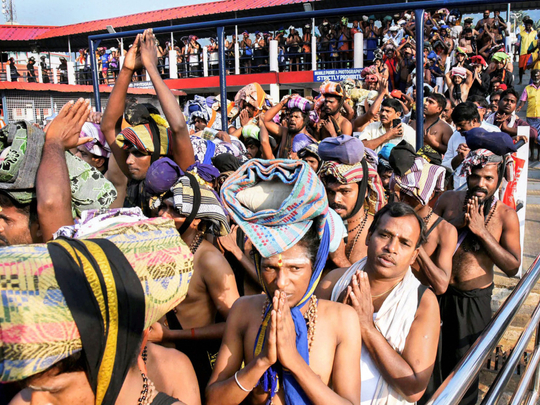
Every year, an estimated 25 million devotees visit Sabarimala, a Hindu shrine in the South Indian state of Kerala, whose deity is Lord Ayyappa. The official calendar for the pilgrimage is from mid-November to mid-January. But unlike any other year in recent times, the days and nights leading up to the closure of the temple gates will seem longer to many.
As the year draws to a close, protests and controversies related to women’s entry to the temple shows no signs of abating. Overturning a 1991 Kerala High Court judgement prohibiting the entry of women above the age of 10 and below the age of 50 to the temple, the Supreme Court of India in September this year declared that a selective ban on women was unconstitutional and discriminatory.
Last weekend more protests erupted as a temple entry woman activist from Maharashtra, a western state in India, on her way to Sabarimala, landed in Cochin Airport and protesters prevented her from coming out of the airport. In the event, the activist finally had to go back without stepping out of the airport. Some half a dozen activists who accompanied her also returned. The activist has said that she would be back soon “by another route.” Again, on Saturday, the state BJP leader, K. Surendran, was arrested for disrupting law and order and remanded to judicial custody. The BJP and other Hindu organisations in the state have threatened to continue the protests.
That the activist is from another state and is seen as an intervention agency from outside Kerala has resulted in a loose bonding of interests across party lines within the state. The ruling Leftist alliance, led by Pinarayi Vijayan, has stated that his government’s alleged heavy handedness in terms of strong security measures is solely to enforce the Supreme Court verdict.
But the fact is that the Left alliance is not entirely clear about how to deal with the implications of that Maharashtra activist’s intervention. Kerala, which prides itself as a top literate state, does not generally take kindly to people from other states deciding local issues. The highly self-aware women in the state are now facing a dilemma. Should they rally behind a ‘parachuting’ (as a critic described) stranger, or should they rally on their own?
Last week, a Hindutva activist, K.P. Sasikala, was taken into ‘preventive custody’ near Sabarimala because she tried to enter the temple. Sasikala is seen by many as a RSS/BJP ploy to pre-empt activists like the Maharashtra activist and others to wrest the agenda from the hands of pro-Hindu organisations. But the issue of temple entry in Kerala is fraught at many levels. As ever, the divine is not just a religious issue. This is especially so in these times when polarisation happens at very many levels, driven by social media and its instantly galvanised hashtags.
In Kerala, the issue of temple entry has always been potent since the first half of the last century. Great leaders like Mahatma Gandhi and Narayana Guru have waged sustained protests to gain entry of lower castes and the underprivileged to temples.
Yet, each temple in Kerala has its customs and rituals which have attained over the years a certain gravitas as tradition. Sabarimala has been traditionally a male bastion — though some experts have questioned it, and said women of all ages have frequented it — if only because the arduous nature of the long pilgrimage which is through mountains and forests. Thousands walk from their home to the far away shrine. And the trip could take weeks. Access, unlike old times though, is now much easier with transport available all the way up to the bottom of the hill on which the shrine is located. It is not just women who are disadvantaged. Kerala is famous for its secular way of life. Along with Hindus, large population of Christians and Muslims co-exist in the state. But should they be allowed entry into temples? The liberal answer is, yes. And Sabarimala in any case exercises no caste or religious discrimination. But some other famous temples in the state do. The great Guruvayur temple in Thrissur, whose deity is Lord Krishna, has famously not given permission to the legendary playback singer and musician, K.J. Yesudas, to enter the temple, though nearly every third devotional song that the temple plays is his. Dr Yesudas is from a Roman Catholic denomination, and has repeatedly expressed his wish to pray at the inner sanctum. But to no avail.
The great virtue of Hinduism is that it is open to all. Yet in these complex times of identity politics, polarisation is likely to have more traction and yield. Which is one reason why a relatively tolerant religion is turning militant.
The BJP in Kerala declared last Sunday as a day of protest. The protest passed off without too many problems. But the temple is open till January 14 to take in the peak season pilgrims. And there will be millions. The chances are that the government of Pinarayi Vijayan has on its hands a loaded situation: the Sabarimala issue is organising itself along the lines of a Hindu solidarity movement cutting across party lines. That can only be to the advantage of the BJP, which has never been a great force in the electoral politics of Kerala. Left or right, the blessings of Lord Ayyappa will count.
C.P. Surendran is a senior journalist based in India.








